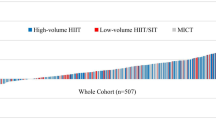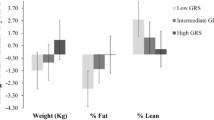Abstract
Both observational studies and randomized, controlled interventions have shown that regular physical activity provides several health benefits. Although exercise programs improve risk factor profiles on average, a substantial body of evidence indicates that there are considerable inter-individual differences in response to these programs. Ability to predict who will be a high- or low-responder to exercise would be desirable from a physiologic and clinical perspective. The first exercise training studies utilizing objective genome-wide screening methods were published in 2010, and both reports identified a group of genes and DNA sequence variants that explained a considerable portion of variance in VO2max training response. These studies strongly suggest that genomic markers can be used to identify high- and low-responders to regular exercise. However, additional research is needed to confirm these findings, to maximize the predictive power of genomic markers in all ethnic groups, and to develop strategies on how to deal with low- and non-responders before predictive genomic markers are ready for clinical use.

Similar content being viewed by others
References
Papers of particular interest, published recently, have been highlighted as: • Of importance ••Of major importance
Morris JN, Heady JA, Raffle PA, Roberts CG, Parks JW. Coronary heart-disease and physical activity of work. Lancet. 1953;262:1111–20.
Morris JN, Heady JA, Raffle PA, Roberts CG, Parks JW. Coronary heart-disease and physical activity of work. Lancet. 1953;262:1053–7.
Blair SN, Kohl HW, Barlow CE, Paffenbarger RS, Gibbons LW, Macera CA. Changes in physical fitness and all-cause mortality. A prospective study of healthy and unhealthy men. JAMA. 1995;273:1093–8.
Blair SN, Kohl 3rd HW, Paffenbarger Jr RS, Clark DG, Cooper KH, Gibbons LW. Physical fitness and all-cause mortality. A prospective study of healthy men and women. JAMA. 1989;262:2395–401.
Paffenbarger Jr RS, Hyde RT, Wing AL, Hsieh CC. Physical activity, all-cause mortality, and longevity of college alumni. N Engl J Med. 1986;314:605–13.
Jones LW, Watson D, Herndon 2nd JE, Eves ND, Haithcock BE, Loewen G, et al. Peak oxygen consumption and long-term all-cause mortality in nonsmall cell lung cancer. Cancer. 2010;116:4825–32.
Sui X, Lee DC, Matthews CE, Adams SA, Hebert JR, Church TS, et al. Influence of cardiorespiratory fitness on lung cancer mortality. Med Sci Sports Exerc. 2010;42:872–8.
Hooker SP, Sui X, Colabianchi N, Vena J, Laditka J, LaMonte MJ, et al. Cardiorespiratory fitness as a predictor of fatal and nonfatal stroke in asymptomatic women and men. Stroke. 2008;39:2950–7.
McAuley P, Pittsley J, Myers J, Abella J, Froelicher VF. Fitness and fatness as mortality predictors in healthy older men: the veterans exercise testing study. J Gerontol A Biol Sci Med Sci. 2009;64:695–9.
Kodama S, Saito K, Tanaka S, Maki M, Yachi Y, Asumi M, et al. Cardiorespiratory fitness as a quantitative predictor of all-cause mortality and cardiovascular events in healthy men and women: a meta-analysis. JAMA. 2009;301:2024–35.
Katzmarzyk PT, Church TS, Craig CL, Bouchard C. Sitting time and mortality from all causes, cardiovascular disease, and cancer. Med Sci Sports Exerc. 2009;41:998–1005.
Church TS, Earnest CP, Skinner JS, Blair SN. Effects of different doses of physical activity on cardiorespiratory fitness among sedentary, overweight or obese postmenopausal women with elevated blood pressure: a randomized controlled trial. JAMA. 2007;297:2081–91.
Church TS, Blair SN, Cocreham S, Johannsen N, Johnson W, Kramer K, et al. Effects of aerobic and resistance training on hemoglobin A1c levels in patients with type 2 diabetes: a randomized controlled trial. JAMA. 2010;304:2253–62.
Nikander R, Sievanen H, Heinonen A, Daly RM, Uusi-Rasi K, Kannus P. Targeted exercise against osteoporosis: A systematic review and meta-analysis for optimising bone strength throughout life. BMC Med. 2010;8:47.
Valkeinen H, Aaltonen S, Kujala UM. Effects of exercise training on oxygen uptake in coronary heart disease: a systematic review and meta-analysis. Scand J Med Sci Sports. 2010;20:545–55.
Kelley GA, Kelley KS. Efficacy of aerobic exercise on coronary heart disease risk factors. Prev Cardiol. 2008;11:71–5.
Physical Activity Guidelines Advisory Committee. Physical activity guidelines advisory committee report. Washington, DC: Department of Health and Human Services; 2008.
Skinner JS, Wilmore KM, Krasnoff JB, Jaskolski A, Jaskolska A, Gagnon J, et al. Adaptation to a standardized training program and changes in fitness in a large, heterogeneous population: the HERITAGE Family Study. Med Sci Sports Exerc. 2000;32:157–61.
Bouchard C, Rankinen T. Individual differences in response to regular physical activity. Med Sci Sports Exerc. 2001;33:S446–51.
•Hamburg MA, Collins FS. The path to personalized medicine. N Engl J Med. 2010;363:301–4. This commentary provides a good overview of the current status and future challenges of personalized medicine.
••Timmons JA, Knudsen S, Rankinen T, Koch LG, Sarzynski M, Jensen T, Keller P, Scheele C, Vollaard NB, Nielsen S, Akerstrom T, MacDougald OA, Jansson E, Greenhaff PL, Tarnopolsky MA, van Loon LJ, Pedersen BK, Sundberg CJ, Wahlestedt C, Britton SL, Bouchard C. Using molecular classification to predict gains in maximal aerobic capacity following endurance exercise training in humans. J Appl Physiol. 2010; 108:1487–1496. This is the first report that combines global skeletal muscle gene expression profiling and DNA sequence variant screening to identify genes and genomic markers associated with VO 2 max training response in humans.
••Bouchard C, Sarzynski MA, Rice TK, Kraus WE, Church TS, Sung YJ, Rao DC, Rankinen T. Genomic Predictors of Maximal Oxygen Uptake Response to Standardized Exercise Training Programs. J Appl Physiol. 2011 (In Press). This is the first exercise training response-related GWAS. The study identified 16 SNPs that collectively explained 45% of variance in VO 2 max training response.
Bouchard C, Dionne FT, Simoneau JA, Boulay MR. Genetics of aerobic and anaerobic performances. Exerc Sport Sci Rev. 1992;20:27–58.
Bouchard C, An P, Rice T, Skinner JS, Wilmore JH, Gagnon J, et al. Familial aggregation of VO2max response to exercise training: results from the HERITAGE Family Study. J Appl Physiol. 1999;87:1003–8.
Disclosure
The authors’ institution received a grant from the National Institutes of Health/National Heart, Lung and Blood Institute to conduct the HERITAGE Family Study.
Author information
Authors and Affiliations
Corresponding author
Rights and permissions
About this article
Cite this article
Rankinen, T., Bouchard, C. Genetic Predictors of Exercise Training Response. Curr Cardiovasc Risk Rep 5, 368–372 (2011). https://doi.org/10.1007/s12170-011-0179-z
Published:
Issue Date:
DOI: https://doi.org/10.1007/s12170-011-0179-z




